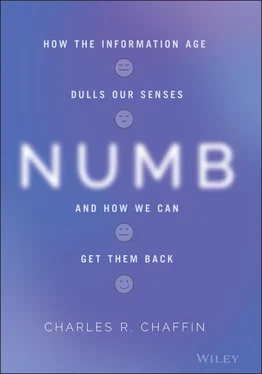There is also a natural tendency for us to take on a distorted view of the world via the news due to the availability heuristic. Psychologists Daniel Kahneman and Amos Tversky suggested that people estimate the probability of an event based upon how easily an instance of it comes to mind. That has particular implications for sensationalized news because stories that are particularly vivid or gruesome will obviously be remembered longer, making it more available in our minds and thus impacting our perception regarding the likelihood of it occurring again. In the 12 months following the September 11 terrorist attacks, many people opted to drive and not fly, even though statistically we all know that there are far fewer deaths from flying (40,000 a year driving in the U.S. compared to a few hundred on average flying). However, the images of the terrorist attacks or other plane crashes are front of mind for many, creating a bias and altering behavior in a potentially irrational way. Regular exposure to sensationalized, horrific events that are remembered for a long time due to their graphic nature can create this distorted view of the world.
Public distrust of the media is an ongoing issue. A 2019 Gallup poll found that 41% of Americans have a “great deal” or “fair amount” of trust in television, radio, and newspapers with regard to “fully, accurately, and fairly” reporting the news. Historically, that same poll, which dates back to 1972, found that 68% of Americans stated they trusted the media. Given the filter bubbles that exist within social media and even cable news, it stands to reason that there would be distrust of news outlets that are at least perceived to have some sort of bias that would prevent them from being a trusted news source. Illustrating some aspect of partisanship is a great way to attract loyal viewership. As Sundar says, “In the current political climate, news organizations have discovered that an easy way to evoke strong emotions and get more eyeballs is to stoke up partisan feelings. As a result, news sites and cable channels have become more extreme in their bias toward the left or right, resulting in great distrust of the media in general.” Sensationalism, whether in the form of outrageous headlines designed to, well, invoke outrage, or clickbait designed to get more clicks on stories, also erodes public confidence in the media. In the short term, media outlets might get the viewers or clicks that they desire, but in the long term, these sensationalist practices can erode public trust.
Being Our Own News Editor
Steven Stosny, PhD, author of nine books and courses on healing and relationship repair, identifies four red flags as it relates to headline stress disorder: “First, you experience a raised pulse rate just before you check the news, and it increases the longer you're viewing or reading. Second, you think about news headlines repeatedly throughout the day and sometimes have trouble sleeping. Third, you're irritated with loved ones after the headlines. Finally, you only read or view articles that make you angry or resentful.” There are lots of things we can do to address headline stress disorder. As Stosny says, “Aristotle pointed out that the only virtue is moderation. It's the ubiquity of headlines that does the damage. Limit exposure to a couple of times per day. Connect to your loved ones. Appreciate beauty in nature, arts, and crafts. Focus on what you can control, that is, your response. Focus on what you like and want more of, rather than what you don't like and don't want.” It might even be just reminding yourself of the blessings or good things that are currently in your life, whether your family, your work, your health, or any other component of your life that you value, as well as realizing that the anxiety we are experiencing because of the news is not required. We do not have to subject ourselves to cable news or social media. Other peoples' hysteria or focus should not dictate where we direct our attention. Engaging in endless back and forth on social media or discussion boards is likely not going to solve anything. Focusing on the positive aspects of our lives, and engaging in them, can be far more valuable than stewing over the news.
We also have a great deal of power in addressing many of the challenges that come from the current news landscape. We can be cognizant of where we are getting our news, ensuring that we are relying upon trusted sources that are presenting an objective view of current events. As Griffin suggests, “A healthy consumption of news and information necessarily involves attention to multiple sources. But consuming multiple sources in and of itself will not necessarily help a person stay well‐informed. And choosing sources based on one's perception of ‘left‐leaning’ vs. ‘right‐leaning’ is not helpful, in my opinion. The perceived political slant of a news source is not a good criterion on which to begin to plan a news diet. Instead, one should seek out news sources that have a reliable track record of responsible and transparent journalism.” We should look at sensationalized headlines and clickbait with a critical eye to ensure that we have a full understanding of the story in spite of the hype. If our main objective is to be well‐informed, we cannot passively trust one source to inform us of what is happening in our world. Media outlets are not designed to just inform us. They have a vested interest in attracting and retaining viewers.
This is not to suggest that all reporters and news organizations are terrible, biased people. Many of them have dedicated their life's work to informing the public. However, in order for us to be both well‐informed and have a healthy relationship with the news, we have a responsibility to ourselves to question both the facts and the impact of those facts on ourselves and those around us. Griffin uses the analogy of a researcher choosing sources to conduct her research. The researcher doesn't look at the political affiliation of the source, but rather, the reputation, integrity, and quality of the source. It is no different in choosing a news source. Finding sources that have a proven track record for covering news and events in a transparent way will help ensure that we are well‐informed regarding current events. We can limit our sources to only a small number and certainly monitor our consumption to avoid being overwhelmed with hyperbole and rhetoric. The rollercoaster that is the 24‐hour news cycle is not a ride that we have to endure. We can pick good sources, limit push notifications, and be sensitive to the time we devote as well as to the anxiety we are feeling while still being well‐informed.
Конец ознакомительного фрагмента.
Текст предоставлен ООО «ЛитРес».
Прочитайте эту книгу целиком, купив полную легальную версию на ЛитРес.
Безопасно оплатить книгу можно банковской картой Visa, MasterCard, Maestro, со счета мобильного телефона, с платежного терминала, в салоне МТС или Связной, через PayPal, WebMoney, Яндекс.Деньги, QIWI Кошелек, бонусными картами или другим удобным Вам способом.












